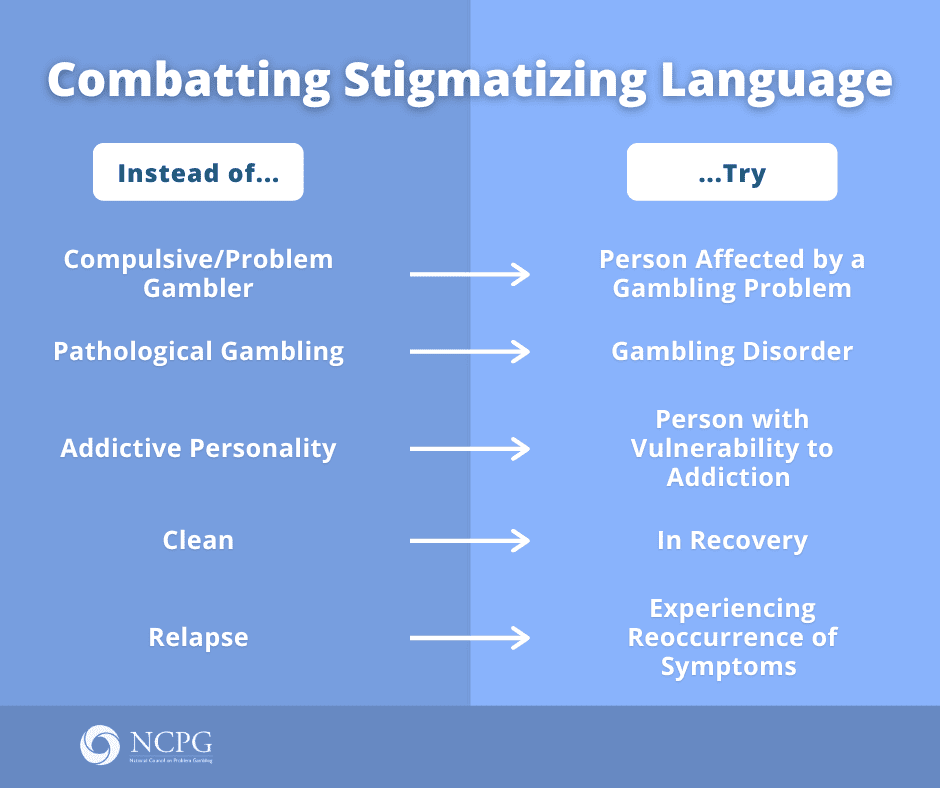The Language We Use Matters: Combatting Stigmatizing Language Around Problem Gambling
The month of September presented us with the unique opportunity to acknowledge two important initiatives – Responsible Gaming Education Month (RGEM), a time when we emphasize the importance of responsible gambling practices and the need for awareness regarding gambling disorders as well as Recovery Month, a monthlong awareness campaign to promote evidence-based treatment and recovery practices while celebrating the resilient recovery community.
While these two observances may seem distinct, they intersect at a critical point – the well-being of individuals struggling with a gambling problem. Today, I want to highlight the importance of avoiding stigmatizing language when referring to these individuals, not only in the media but also in storytelling, conversations and our daily lives.
Language is not just a means of communication; it shapes our thoughts, perceptions and attitudes.
It has the ability to uplift and empower, but it can also harm and stigmatize. We must recognize the immense responsibility that comes with our words and the potential consequences they may inflict. Stigmatizing language dehumanizes, isolates and marginalizes while perpetuating harmful stereotypes.

Embracing person-first language in discussing gambling disorders is an ethical stance, crucial for reducing stigma and affirming identity beyond the disease.
We must recognize that using appropriate language when discussing problem gambling is not a matter of political correctness but an ethical imperative. It begins with a simple yet profound shift in perspective – putting the person first and the disease second. This terminology underscores the belief that gambling disorder is a secondary attribute and not the defining characteristic of an individual’s identity. This linguistic transformation is not merely a matter of semantics; it is about dispelling widespread misconceptions and reducing the stigma surrounding gambling disorders.
Public stigma has tangible, real-world consequences. Despite substantial evidence of the potential for recovery, the shame and stigma around gambling disorders have erected formidable barriers for treatment-seeking individuals. The shame linked to grappling with a gambling problem, the self-inflicted stigma that comes with acknowledging the existence of a problem, the apprehension of facing societal judgment, and the stigma tied to seeking treatment can impede and discourage individuals from seeking help.
It is our collective responsibility to be mindful of the words we use and the narratives we propagate, for they profoundly impact the lives of those affected by gambling addiction.
Telling stories of recovery in a non-stigmatizing way will help inspire those currently struggling to reach out for help. We must also share the evidence-based solutions that exist to help those in need. The National Council on Problem Gambling operates the National Problem Gambling Helpline (1-800-GAMBLER), which offers call, text and chat support nationwide, 24/7/365.
The National Council on Problem Gambling stands firmly in support of individuals in recovery from gambling problems. Labels matter, and through our work, we have witnessed the incredible strength, sincerity, humility, compassion and resilience exhibited by those on the journey to recovery.
I sincerely hope you will join me in championing the cause of eradicating stigmatizing language when discussing gambling disorders from our discourse. By doing so, we can contribute to a more inclusive, empathetic and informed society. We must remember that behind every statistic is a person whose story deserves to be told with dignity and respect.
Thank you,

Keith S. Whyte
Executive Director
For questions contact
Cait Huble
caith@ncpgambling.org
